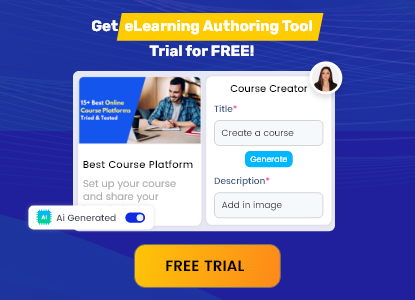Choosing the right E-Learning Authoring Tool is crucial for creating engaging and effective online courses. With numerous options available, selecting the best fit for your needs can be overwhelming. Asking the right questions ensures that your investment aligns with your instructional goals, technical capabilities, and budget. This guide will walk you through the essential questions to ask before making a decision.
What Are Your Learning Objectives and Target Audience?
Before selecting an E-Learning Authoring Tool, define your learning objectives and understand your audience. Ask yourself:
- What skills or knowledge should learners acquire?
- Is the content for corporate training, academic courses, or self-paced learning?
- What is the technical proficiency of your learners?
- Do they require accessibility features such as screen readers or translations?
Understanding these factors ensures the tool supports the content type and engagement level needed.
Is the Tool User-Friendly and Intuitive?
- Does it require coding or instructional design expertise?
- Are there drag-and-drop features for easy content creation?
- Is there a trial version available to test usability?
- How efficient is the workflow for adding multimedia, quizzes, and interactive elements?
A tool with a seamless user experience ensures quicker adoption and efficient course development.
Does It Support Multiple Content Formats and Interactivity?
- Can the tool create interactive quizzes, videos, simulations, and gamified elements?
- Does it support SCORM, xAPI, or HTML5 for broader compatibility?
- Can you integrate third-party tools like YouTube, PowerPoint, or VR elements?
- Does it support mobile-responsive content for learners on the go?
A versatile authoring tool enhances engagement and accessibility across various learning formats.
How Does It Handle Collaboration and Teamwork?
- Does it allow multiple users to work simultaneously?
- Are version control and feedback tools available?
- Can roles be assigned to control editing rights?
- Is there cloud-based access for remote collaboration?
Team collaboration tools streamline content development and ensure consistency across training materials.
What Are the Deployment and Hosting Options?
- Is it a cloud-based or desktop software?
- Can courses be deployed on any LMS or is it restricted to specific platforms?
- Does it offer offline access or mobile app support?
- How easily can you export and migrate content if needed?
Understanding deployment options ensures seamless content delivery across various platforms.
What Level of Customization and Branding Does It Offer?
- Can you add company logos, colors, and themes?
- Does it allow custom fonts, animations, and templates?
- Can you modify UI elements for a personalized learning experience?
A highly customizable tool helps maintain brand consistency and enhances learner engagement.
What Are the Pricing and Licensing Options?
- Is it a one-time purchase, subscription-based, or pay-per-user model?
- Are there hidden fees for updates, plugins, or extra features?
- Does it offer a free trial or demo?
- How does its cost compare with competitors?
Understanding the pricing model ensures you get the best value without unexpected expenses.
How Strong Is Customer Support and Community Engagement?
- Does it offer 24/7 customer support?
- Are there tutorials, documentation, and forums for self-help?
- What do user reviews say about response times and issue resolution?
Good customer support ensures smooth implementation and troubleshooting when needed.
What Are the Security and Compliance Standards?
- Does it comply with GDPR, HIPAA, or other data protection regulations?
- Are backups and encryption features available?
- How frequently are security updates released?
Choosing a secure platform protects user data and ensures compliance with legal requirements.
Final Thoughts
Selecting the right E-Learning Authoring Tool impacts the effectiveness of your training programs. By asking the right questions, you can ensure a perfect fit for your e-learning needs. Ready to explore top authoring tools? Try a free demo today and take your e-learning to the next level!






















